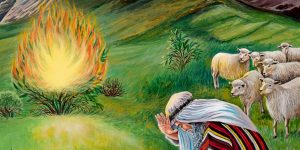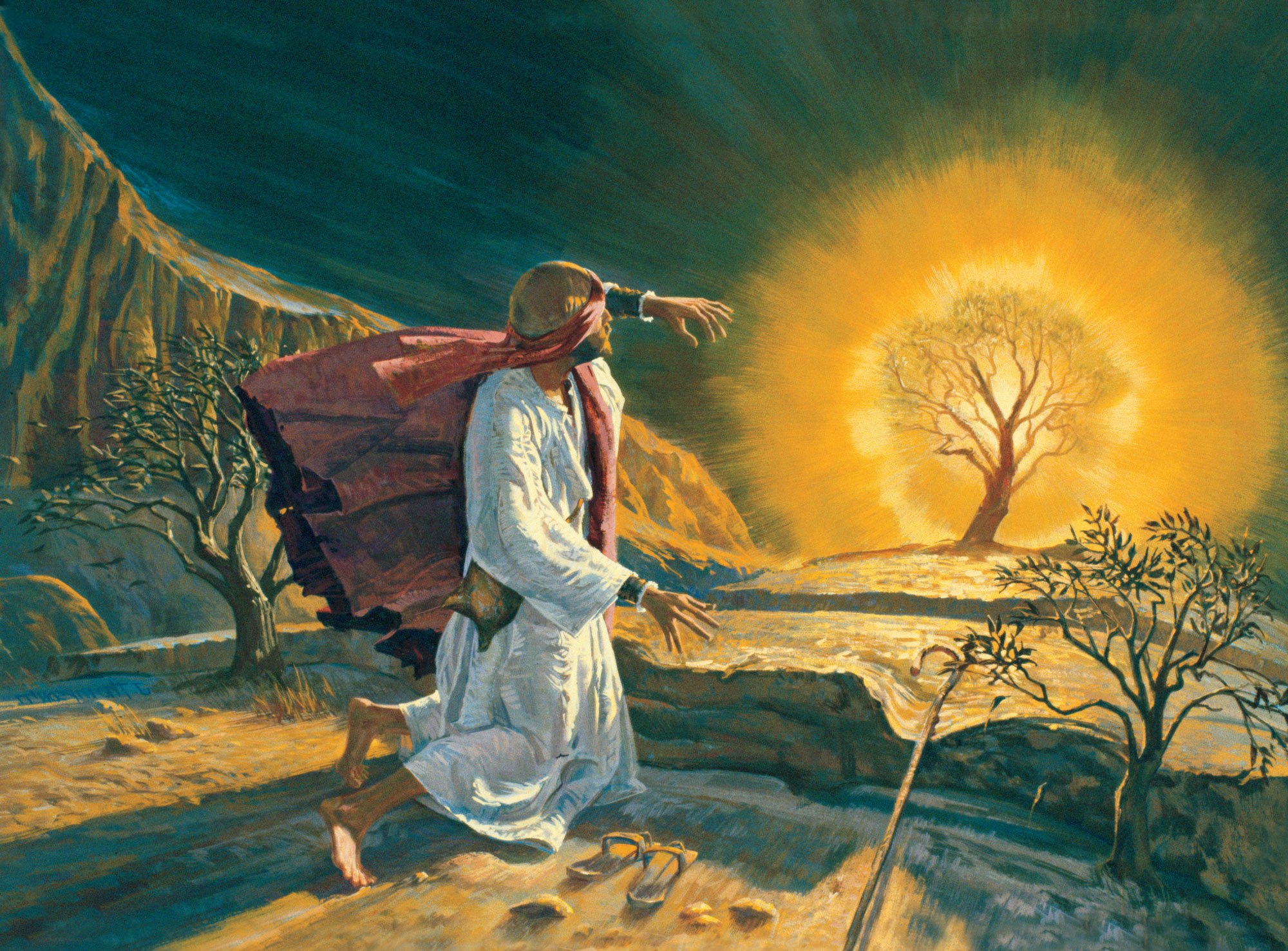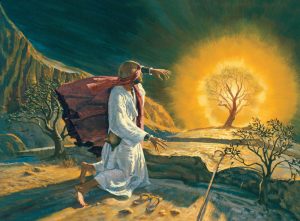Kissing Permitted
Last week, we pulled down the curtain on Sefer Bereishis (the Book of Genesis). We said goodbye and au revoir -until next year- to our ovois and emohois: Avrohom, Yitzchok and Yaakov and their wives Soro, Rivka, Rochel, Leah, Bilha and Zilpa. Nu, speaking of Bilha and Zilpa, which we did a few weeks back, this past shabbis, someone passed me a shtikel pshat written by the Lubabitcher Rebbe A’H, which said azoy: under an alternative count of the four mothers, we may list Rochel, Leah, Bilha and Zilpa only. After all, did these four great women not give birth to all twelve of the heylige shevotim, the Shivtay Ko? They did! And do we -all of us- not trace our lineage back to one of these four women? We do: case closed. Let’s go veyter and open Sefer Shemois (the book of Exodus) being reviewed by the Oisvorfer for a ninth time. Feel free to check out the archives at www.oisvorfer.com for past postings. They are mamish givaldig!
Avada you all know that it’s in parshas Shemois where we meet Moishe for the very first time. And this week, we’ll also meet his older brother Aharoin, his sister Miriam and others. Going forward, Moishe’s name will appear in every single parsha, sans one, until we conclude the entire Toirah cycle. In this week’s parsha we will also learn of the slavery the Yiddin were subjected to, and how the Yiddin suffered terribly under Paroy’s enactments. Amazingly enough, the entire slavery which lasted at least 210 years is over in a short number of pisukim. The rest of the parsha is about the methods employed by the RBSO, enacted by Moishe and sometimes with Aharoin, to get the Yiddin out of Mitzrayim. In the end, how long were the Yiddin subjected to slavery? Ver veyst? Initially the RBSO told Avrohom (way back in parsha Lech Lecha) that the Yiddin would be strangers (read: enslaved) for a total of 400 years. So says the heylige Toirah:
| 13. And He said to Avram, “You shall surely know that your seed will be strangers in a land that is not theirs, and they will enslave them and oppress them, for four hundred years. | יגוַיֹּ֣אמֶר לְאַבְרָ֗ם יָדֹ֨עַ תֵּדַ֜ע כִּי־גֵ֣ר | יִֽהְיֶ֣ה זַרְעֲךָ֗ בְּאֶ֨רֶץ֙ לֹ֣א לָהֶ֔ם וַֽעֲבָד֖וּם וְעִנּ֣וּ אֹתָ֑ם אַרְבַּ֥ע מֵא֖וֹת שָׁנָֽה: |
Ober, as we will learn in this week’s parsha and again towards the end of Parshas Boi, somehow, the 400 turned into 210. How? Fuzzy accounting? Did the RBSO change His mind? Commute their sentence. Did they qualify for sentence reform? One pshat tells us that it happened azoy: Taka the RBSO told Avrohom that his progeny would be strangers in a land that does not belong to them for 400 years. Ober, at that time, the number of Yiddin affected by the decree, was but 600,000. In other words: the RBSO’s words were only meant to cover 600,000 people. In more other words: each person needed to serve a specific amount of time, and collectively, their work output, amounted to 400 years of slave labor. Ober the RBSO in His magnificence, feeling badly for the Yiddin, came up with his own unique plan.
 As we will learn in the first aliya, the Yiddin were multiplying at a very enhanced rate. The more the Mitzrim (Egyptians) tortured them, the more children sprouted forth from the neshey chayil (the wives). Says the heylige Toirah (Shemois 1:12), azoy:
As we will learn in the first aliya, the Yiddin were multiplying at a very enhanced rate. The more the Mitzrim (Egyptians) tortured them, the more children sprouted forth from the neshey chayil (the wives). Says the heylige Toirah (Shemois 1:12), azoy:
| 12. But as much as they would afflict them, so did they multiply and so did they gain strength, and they were disgusted because of the children of Yisrael. | יבוְכַֽאֲשֶׁר֙ יְעַנּ֣וּ אֹת֔וֹ כֵּ֥ן יִרְבֶּ֖ה וְכֵ֣ן יִפְרֹ֑ץ וַיָּקֻ֕צוּ מִפְּנֵ֖י בְּנֵ֥י יִשְׂרָאֵֽל: |
Some say that each woman gave birth to six in one gestation. Another suggests that the number was twelve. Ober, another medrish tells us that the women carried and somehow delivered sixty in one pregnancy. And all healthy. How is that possible? Ver Veyst? Ober we don’t argue with the RBSO. Given that the Yiddin were multiplying that quickly and as their numbers grew exponentially, there were more of them available for the workforce. And that was -according to this pshat- the RBSO’s master plan to cut the years down from 400 to 210. Feeling badly for the Yiddin, hearing their cries, He did the following. Says the heylige Toirah, the more the Mitzrim tortured the Yiddin, the more fruitful they became; they multiplied. The result: more Yiddin in the workforce. And taka, the more they propagated, the more nervous Paroy became and therefore said to his people to make a plan of action. He seemingly knew that as the Yiddin multiplied, his days as their enslaver and master would run out. Says the heylige Toirah:
| 9. He said to his people, “Behold, the people of the children of Yisrael are more numerous and stronger than we are. | טוַיֹּ֖אמֶר אֶל־עַמּ֑וֹ הִנֵּ֗ה עַ֚ם בְּנֵ֣י יִשְׂרָאֵ֔ל רַ֥ב וְעָצ֖וּם מִמֶּֽנּוּ:
|
||||
| 10. Get ready, let us deal shrewdly with them, lest they increase, and a war befall us, and they join our enemies and wage war against us and depart from the land.” | יהָ֥בָה נִתְחַכְּמָ֖ה ל֑וֹ פֶּן־יִרְבֶּ֗ה וְהָיָ֞ה כִּֽי־תִקְרֶ֤אנָה מִלְחָמָה֙ וְנוֹסַ֤ף גַּם־הוּא֙ עַל־שׂ֣נְאֵ֔ינוּ וְנִלְחַם־בָּ֖נוּ וְעָלָ֥ה מִן־הָאָֽרֶץ: | ||||
Shoin! As Paroy put them to work -slave labor mamish- the RBSO computed their hours and added those hours to the total. Shoin, when all was done, and using taka some creative accounting methods -methods that have over the years, gotten many into trouble- it worked out azoy: the number of hours the RBSO had in mind as slave labor were fulfilled by year 210 and shoin, by the end of the first Aliya, the RBSO was already making plans for their redemption. Gishmak and let’s go veyter.
 We all recall Moishe’s birth and leisurely cruise down the river in a protective basket, and how he was found by Paroy’s daughter Bisya. We all recall that Moishe, now grown up and after killing a Mitzri, was on the run, how he settled in Midyan, and how he met his bashert Tzipoirha at the well. A number of great Toirah personalities met their future wives near water. We of course recall Yaakov’s encounter at the well and let’s not forget the words of the heylige Toirah which told us that our zeyda Yitzchok was on his way back from a pace called Be’er Lachai Roi’ee (Be’er meaning well) when he encountered Rivka, and now Moishe. As well, we know how the RBSO -while Moishe was out shepherding his father in law’s sheep- had an encounter with a burning bush. No one ever forgets such an encounter, if you chap.
We all recall Moishe’s birth and leisurely cruise down the river in a protective basket, and how he was found by Paroy’s daughter Bisya. We all recall that Moishe, now grown up and after killing a Mitzri, was on the run, how he settled in Midyan, and how he met his bashert Tzipoirha at the well. A number of great Toirah personalities met their future wives near water. We of course recall Yaakov’s encounter at the well and let’s not forget the words of the heylige Toirah which told us that our zeyda Yitzchok was on his way back from a pace called Be’er Lachai Roi’ee (Be’er meaning well) when he encountered Rivka, and now Moishe. As well, we know how the RBSO -while Moishe was out shepherding his father in law’s sheep- had an encounter with a burning bush. No one ever forgets such an encounter, if you chap.
In any event, for reasons only the RBSO knows, the rest of us have to guess -He does run the world- Moishe was selected to go back to Mitzrayim (Egypt) and have a talk with Paroy during which he was to let him know that the RBSO wants Paroy to let the Hebrews leave on a three day journey, a furlough, to serve their Master in the wilderness. The Yiddin zicher had no plans of returning and Moishe was zicher not telling Paroy the emes. Hec, many lie without being told; avada when the RBSO says to fib a bit, we listen. The emes is that the lie was necessary in order to ensure that the Egyptians would lend -never to be repaid- the Yiddin all sorts of goodies -silver, gold, clothing- on their way out. We will address that topic in a few weeks. Ober this week, let’s learn what the medrish has to say about the first encounter between Moishe and Aharoin when they met up in the Midbar.
During the interview process near the burning bush, Moishe complained about his speech impediment. He told the RBSO that he was the wrong man for the job. The RBSO instructed him to meet up with his older brother Aharoin who would act as his mouthpiece to Paroy. Says the heylige Toirah (Shemois 4:14)
| 14. And the Lord said to Moishe, “Stretch forth your hand and take hold of its tail.” So Moishe stretched forth his hand and grasped it, and it became a staff in his hand. | דוַיֹּ֤אמֶר יְהֹוָה֙ אֶל־משֶׁ֔ה שְׁלַח֙ יָֽדְךָ֔ וֶֽאֱחֹ֖ז בִּזְנָב֑וֹ וַיִּשְׁלַ֤ח יָדוֹ֙ וַיַּ֣חֲזֶק בּ֔וֹ וַיְהִ֥י לְמַטֶּ֖ה בְּכַפּֽוֹ: |
At, or about the same time, the RBSO told Aharoin to go out and greet his brother Moishe. Says the heylige Toirah (Shemois 4:27), azoy:
| 27. The Lord said to Aharoin, “Go toward Moishe, to the desert.” So he went and met him on the mount of G-d, and he kissed him. | כזוַיֹּ֤אמֶר יְהֹוָה֙ אֶל־אַֽהֲרֹ֔ן לֵ֛ךְ לִקְרַ֥את משֶׁ֖ה הַמִּדְבָּ֑רָה וַיֵּ֗לֶךְ וַיִּפְגְּשֵׁ֛הוּ בְּהַ֥ר הָֽאֱלֹהִ֖ים וַיִּשַּׁק־לֽוֹ: |
Avada you can imagine the excitement as the brothers who had not seen each other in at least several decades, met up. How long was it? Ever since, Moishe skedaddled out of town after whacking the Mitzri. Let’s read what happened next.
Both of course followed orders. “…..They met in the mountain of God and “he kissed him.”” Who kissed whom? We’ll get to that in a moment, ober says the medrish azoy: this demonstrates the great brotherly love between Moishe and Aharoin, as each was rejoicing in the other’s ascension to greatness. And if in Sefer Bereishis, we encountered only feuding brothers, brothers who hated one another, brothers who plotted to kill one another, and in the extreme, a case where 10 brothers plotted to kill one of their own, here in Shemois -at the outset mamish- we have a case of two brothers showing love and real respect for one another. It’s about time!
 Says the medrish (Medrish Rabbah): thus is written (Shir Hashirim 8:1), azoy:
Says the medrish (Medrish Rabbah): thus is written (Shir Hashirim 8:1), azoy:
|
אמִ֤י יִתֶּנְךָ֙ כְּאָ֣ח לִ֔י יוֹנֵ֖ק שְׁדֵ֣י אִמִּ֑י אֶֽמְצָֽאֲךָ֤ בַחוּץ֙ אֶשָּׁ֣קְךָ֔ גַּ֖ם לֹֽא־יָבֻ֥זוּ לִֽי: |
Says the medrish: this verse describes, and is a metaphor for how Israel longs to be close to the RBSO, as one brother is close to another. Ober, asks the medrish so givaldig azoy: regarding which set of brothers is Scripture speaking? If you want to say, Scripture is speaking about Kayin and Hevel (Kain and Abel), didn’t we learn in Beresihis (4:8) that Kayin rose and killed Hevel? We did. They’re out! Shoin, maybe Scripture is talking about the relationship between Yitzchok and Yishmoale, both sons of Avrohom Ovenu? Seemingly they too are out because we also learned that Yishmoale hated Yitzchok. Moreover says the Medrish Tanchuma that Yishmoale wanted to kill Yitzchok. Certainly there was no brotherly love there. Shoin, let’s move on, efsher Scripture was talking about the relationship between Yaakov and Eisav? Also not, as the heylige Toirah told us that Eisav wanted to kill Yaakov. Zicher you recall that, ober just in case, here is the posik as recorded in Bereishis 27:41.
| 41. And Eisav hated Yaakov because of the blessing that his father had blessed him, and Eisav said to himself, “Let the days of mourning for my father draw near, I will then kill my brother Yaakov.” | מאוַיִּשְׂטֹ֤ם עֵשָׂו֙ אֶת־יַֽעֲקֹ֔ב עַל־הַ֨בְּרָכָ֔ה אֲשֶׁ֥ר בֵּֽרֲכ֖וֹ אָבִ֑יו וַיֹּ֨אמֶר עֵשָׂ֜ו בְּלִבּ֗וֹ יִקְרְבוּ֙ יְמֵי֙ אֵ֣בֶל אָבִ֔י וְאַֽהַרְגָ֖ה אֶת־יַֽעֲקֹ֥ב אָחִֽי: |
Veyter. Let’s then examine the relationship between our hero Yoisef and his holy brothers. Avada you know that cannot be what Scripture is referring to when it tells us that the Yiddin’s feeling for the RBSO are like the feelings of love between two bothers. Did we not read and discuss how the brothers wanted to kill Yoisef? We did! Let’s read that posik one more time as found in Bereishis 37:4
| 4. And his brothers saw that their father loved him more than all his brothers, so they hated him, and they could not speak with him peacefully. | דוַיִּרְא֣וּ אֶחָ֗יו כִּֽי־אֹת֞וֹ אָהַ֤ב אֲבִיהֶם֙ מִכָּל־אֶחָ֔יו וַיִּשְׂנְא֖וּ אֹת֑וֹ וְלֹ֥א יָֽכְל֖וּ דַּבְּר֥וֹ לְשָׁלֹֽם: |
Veyter. Nu, if you recall, Yoisef and his little brother Binyomin did love each other. Ober says the medrish that the love they had for one another is not the love being referred to in Shir Hashirim where Shlomo Hamelech stated “if only you were as my brother, like a brother nurtured at my mother’s breasts…when I found you outside, I would kiss you.” Why not? Because Rochel sadly died while delivering Binyomin and little Binyomin never got to enjoy his mother’s breasts. In the end, midrash concludes that the brothers being referred to by Shlomo Hamelech are none other than Moishe and Aharoin who met each other, after decades apart, when Aharoin was 83 and Moishe already 80, and then kissed each other. So gishmak.
 Speaking of sucking on breasts, and as an aside, in Parshas Shemois, we will also learn -from the medrish of course- that Moishe refused to be nursed by any of the shiksa Mitzri girls who accompanied Bisya to the river’s edge, where Moishe was first seen floating in his basket. And through a series of events only the RBSO can arrange, it so happened that his older sister Miriam -perhaps six years old at the time, helped arrange things so that Moishe would be nursed by his own mother who, though approximately or exactly 130 years old, was still able to provide Moishe with his nutritional needs. The bottom line: Sefer Shmois describes many miracles; more, bigger and better still to come in the coming weeks. Stay tuned!
Speaking of sucking on breasts, and as an aside, in Parshas Shemois, we will also learn -from the medrish of course- that Moishe refused to be nursed by any of the shiksa Mitzri girls who accompanied Bisya to the river’s edge, where Moishe was first seen floating in his basket. And through a series of events only the RBSO can arrange, it so happened that his older sister Miriam -perhaps six years old at the time, helped arrange things so that Moishe would be nursed by his own mother who, though approximately or exactly 130 years old, was still able to provide Moishe with his nutritional needs. The bottom line: Sefer Shmois describes many miracles; more, bigger and better still to come in the coming weeks. Stay tuned!
Shoin, having figured out whom Shlomo Hamelech was referring to, the medrish now tackles the subject of kissing: when is kissing appropriate? May men exchange kisses? May they kiss women? Moishe and Aharoin met and they kissed each other. Said our holy rabbis: all kissing is folly except for three types: 1- the kiss of high rank; 2- the kiss of separating; 3- the kiss of reuniting those who have been apart. This last kiss is referring to the kisses exchanged between Moishe and Aharoin as discussed above.
And adds the medrish: some say that the kiss of kinship is not a shameful kiss. What kiss is that? Medrish here is referring to the kiss Yaakov gave Rochel at first sight. Avada you recall that Yaakov laid his eyes on Rochel, and before any substantial words were exchanged -perhaps none at all- he kissed her. This kiss is not shameful because she was a relative. Avada you recall that Yaakov and Rochel were first cousins though they had seemingly never before met. Says the Matnas Kihuna: relatives hug and kiss out of love and affection, ober this is not considered inappropriate. As an aside, this view is supported by other commentators, a number of them, but of course this view is not supported by those in the yeshiva world where, if word gets out, that you and your cousins have been exchanging kisses, you could be thrown out of yeshiva and certainly won’t be in the running for a shidduch. Then again, the yeshiva world should chap that most of you (us) cannot control your urges, and unlike Yaakov who did not give forth his first emissions, if you chap, until the age of 84, for most of you….well, you chap. And that raboyseyee is why Yaakov got a pass. He was Yaakov Ovenu and you are mistama kissing others who are not your cousins while having other thoughts.
A gittin Shabbis-
The Heylige Oisvorfer Ruv
Yitz Grossman

